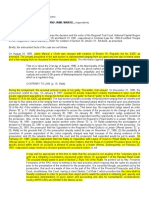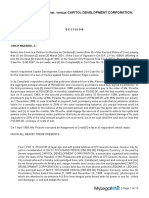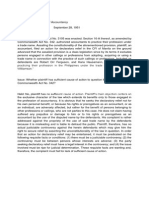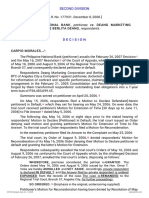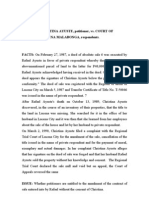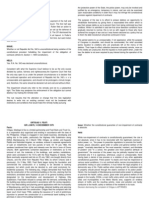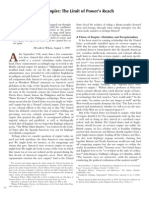607 Abella Vs NLRC
607 Abella Vs NLRC
Uploaded by
Julius ManaloCopyright:
Available Formats
607 Abella Vs NLRC
607 Abella Vs NLRC
Uploaded by
Julius ManaloOriginal Description:
Original Title
Copyright
Available Formats
Share this document
Did you find this document useful?
Is this content inappropriate?
Copyright:
Available Formats
607 Abella Vs NLRC
607 Abella Vs NLRC
Uploaded by
Julius ManaloCopyright:
Available Formats
607
Abella vs NLRC
G. R. No. 71813
Petitioner: Rosalina Perez Abella
Respondents: National Labor Relations Commission and Romeo Quitco et al.
Article III, Section 10
FACTS:
On June 27, 1960, petitioner Rosalina Perez Abella leased a farmland in Monteverde, Negros
Occidental, known as Hacienda Danao-Ramona, for a period of ten years, renewable for another ten
years upon her discretion. In 1970, she renewed her contract for another 10 years. During the existence
of the lease, she employed private respondents Quitco and Dionele. Upon the expiration of the lease,
she terminated private respondents and turned over the hacienda to the owners.
Private respondents filed a complaint against the petitioner at the Ministry of Labor and Employment in
Bacolod City for overtime pay, illegal dismissal, and reinstatement with backwages. The labor arbiter
ruled that the dismissal is warranted by the cessation of business, but granted the private respondents
separation pay.
ISSUE:
Whether or not private respondents are entitled to separation pay
RULING + RATIO:
YES.
Petitioner claims that since her lease agreement already expired, she is not liable for payment of
separation pay. She could also not reinstate the complainants in the farm because the complete
cessation or closure of a business operation is a just cause for employment termination under Article
272 of the Labor Code. On the other hand, the Labor Arbiter invoked Section 15 of BP Bilang 130 in
granting separation pay to the private respondents. Petitioner then contends that the said provision
violates the constitutional guarantee against impairment of obligations and contracts, because when she
leased Hacienda Danao-Ramona on June 27, 1960, neither she nor the lessor contemplated the creation
of the obligation to pay separation pay to workers at the end of the lease.
It should not be overlooked, however, that the prohibition to impair the obligation of contracts is not
absolute and unqualified. In spite of the constitutional prohibition the State continues to possess
authority to safeguard the vital interests of its people.
For not only are existing laws read into contracts in order to fix the obligations as between the parties
but the reservation of essential attributes of sovereign power is also read into contracts as a postulate of
the legal order. All contracts made with reference to any matter that is subject to regulation under the
police power must be understood as made in reference to the possible exercise of that power.
In order to determine whether legislation unconstitutionally impairs contract of obligations, no
unchanging yardstick by which the validity of each statute may be measured or determined has been
Prepared by: Cheza Marie Biliran !1
607
fashioned. However, the Court noted that every case must be determined upon its own circumstances.
In other words, it is on a case to case basis. Legislation impairing the obligation of contracts can be
exempted when it is: (1) enacted for the promotion of the general welfare of the public, and (2) when
the means adopted must be legitimate.
The Court added that the purpose of Article 284 as amended is to protect the rights of workers whose
employment is terminated because of the closure of establishment and reduction of personnel.
Petition is DISMISSED.
Prepared by: Cheza Marie Biliran !2
You might also like
- 33 Case Concerning Avena and Other Mexican NationalsDocument2 pages33 Case Concerning Avena and Other Mexican NationalsJulius ManaloNo ratings yet
- Doj Law Enforce Policy Procedures ManualDocument554 pagesDoj Law Enforce Policy Procedures ManualDouble Chocolate Ice CreamNo ratings yet
- Sec. de Lima vs. GatdulaDocument5 pagesSec. de Lima vs. GatdulaMj BrionesNo ratings yet
- Section 7-D Azarcon-v-SandiganbayanDocument2 pagesSection 7-D Azarcon-v-SandiganbayanKristelle IgnacioNo ratings yet
- National Mines VS San Ildefonso LaborDocument2 pagesNational Mines VS San Ildefonso LaborDanyNo ratings yet
- Digest Format (Final)Document2 pagesDigest Format (Final)Josh GatusNo ratings yet
- (CASE DIGEST) Manotok V NHADocument2 pages(CASE DIGEST) Manotok V NHAJoshvic WarqueNo ratings yet
- People V Doriquez G.R. No. L24444-45 July 29, 1968Document5 pagesPeople V Doriquez G.R. No. L24444-45 July 29, 1968dondzNo ratings yet
- Tilendo Vs OmbudsmanDocument1 pageTilendo Vs OmbudsmanVINA LORRAINE MARASIGANNo ratings yet
- Chavez vs. CADocument1 pageChavez vs. CAVince LeidoNo ratings yet
- Villegas Vs Hiu Chiong Tsai Pao HoDocument1 pageVillegas Vs Hiu Chiong Tsai Pao HoleslansanganNo ratings yet
- ASL v. Sec of Agrarian ReformDocument2 pagesASL v. Sec of Agrarian ReformJomar TenezaNo ratings yet
- 210 SCRA 246 Pp. of The Phils. vs. Martin Villarama, G.R. No. 99287, June 23, 1992Document4 pages210 SCRA 246 Pp. of The Phils. vs. Martin Villarama, G.R. No. 99287, June 23, 1992footsock.kierNo ratings yet
- Case AssignmentDocument13 pagesCase AssignmentMartin FontanillaNo ratings yet
- Sales AssignmentDocument3 pagesSales AssignmentDANICA FLORESNo ratings yet
- Edgar Ledonio Vs Capitol Devt CorpDocument13 pagesEdgar Ledonio Vs Capitol Devt CorpGennard Michael Angelo AngelesNo ratings yet
- Forbes, Etc., vs. Chuoco Tiaco and Crossfield., 16 Phil. 534Document120 pagesForbes, Etc., vs. Chuoco Tiaco and Crossfield., 16 Phil. 534LeoAngeloLarciaNo ratings yet
- Subsequent PunishmentDocument7 pagesSubsequent PunishmentMarivicTalomaNo ratings yet
- DelicadezaDocument7 pagesDelicadezaromeo n bartolomeNo ratings yet
- Roan v. GonzalesDocument2 pagesRoan v. GonzalesMoon BeamsNo ratings yet
- CHREA Vs CHRDocument2 pagesCHREA Vs CHRLittle GirlblueNo ratings yet
- Consti Law II Mid-Term Review 2014Document2 pagesConsti Law II Mid-Term Review 2014Audrey MartinNo ratings yet
- Procedural Due Process - Asst. Executive SecretaryDocument28 pagesProcedural Due Process - Asst. Executive SecretaryEzra Hilary CenizaNo ratings yet
- Tolentino vs. Board of Accountancy DigestDocument1 pageTolentino vs. Board of Accountancy DigestTine TineNo ratings yet
- Malabanan Vs RamentoDocument2 pagesMalabanan Vs RamentoMiko TrinidadNo ratings yet
- Vargas Case Digests - : Mcia V. Court of AppealsDocument1 pageVargas Case Digests - : Mcia V. Court of AppealsAdrian Jeremiah VargasNo ratings yet
- 8 - PNB v. Deang Marketing (2008) PDFDocument11 pages8 - PNB v. Deang Marketing (2008) PDFGianNo ratings yet
- BPI vs. SarmientoDocument5 pagesBPI vs. SarmientoJeryl Grace FortunaNo ratings yet
- Legal MemoDocument3 pagesLegal MemoGuri ShkodraNo ratings yet
- Abela Vs GolezDocument15 pagesAbela Vs GolezYggyNarvasaLuzaNo ratings yet
- h. Villarica Pawnshop, Inc. v. Social Security Commission, Social Security System, Amador m. Monteiro, Santiago Dionisio r. Agdeppa, Ma. Luz n. Barros-magsino, Milagros n. Casuga and Jocelyn q. Garcia (g.r. No. 228087. January 24, 2018.* )Document16 pagesh. Villarica Pawnshop, Inc. v. Social Security Commission, Social Security System, Amador m. Monteiro, Santiago Dionisio r. Agdeppa, Ma. Luz n. Barros-magsino, Milagros n. Casuga and Jocelyn q. Garcia (g.r. No. 228087. January 24, 2018.* )Ab CastilNo ratings yet
- Malacat v. CA Consti Case DigestDocument4 pagesMalacat v. CA Consti Case DigestViene CanlasNo ratings yet
- Constitutional Law: VALLEJO VS CA: Requisites For Issuing Search WarrantDocument1 pageConstitutional Law: VALLEJO VS CA: Requisites For Issuing Search WarrantChenny AbellaNo ratings yet
- Crim Procedure MockboardDocument9 pagesCrim Procedure MockboardDaphney Claire PinedaNo ratings yet
- StatCon - Chapter 7Document5 pagesStatCon - Chapter 7Kath Nacional100% (1)
- Department of Education, Culture and Sports vs. San Diego (Police Power) PDFDocument9 pagesDepartment of Education, Culture and Sports vs. San Diego (Police Power) PDFLorna PaghunasanNo ratings yet
- 11 Cabal v. KapunanDocument1 page11 Cabal v. KapunanloschudentNo ratings yet
- HW No. 2 - Victoria Planters Vs Victoria MillingDocument2 pagesHW No. 2 - Victoria Planters Vs Victoria MillingAilyn AñanoNo ratings yet
- Union - Occeña v. Comelec, 127 SCRA 404Document2 pagesUnion - Occeña v. Comelec, 127 SCRA 404Andre AtesNo ratings yet
- Salvatierra V CADocument7 pagesSalvatierra V CACzarina CidNo ratings yet
- Abad vs. RTC Manila, 10 - 12 - 1987Document3 pagesAbad vs. RTC Manila, 10 - 12 - 1987I took her to my penthouse and i freaked itNo ratings yet
- Zabal V Duterte Full TextDocument27 pagesZabal V Duterte Full TextCharisse ToledoNo ratings yet
- Emeritus Security V DailigDocument2 pagesEmeritus Security V DailigChelle BelenzoNo ratings yet
- 02 Evangelista v. JarencioDocument2 pages02 Evangelista v. Jarenciod2015memberNo ratings yet
- Heirs of Christina AyusteDocument2 pagesHeirs of Christina Ayustejerson_xx6816No ratings yet
- Upload 2 - DESAMA V GozunDocument5 pagesUpload 2 - DESAMA V GozunPatricia VillamilNo ratings yet
- Rutter Vs Esteban G.R. NO. L-3708. MAY 18, 1953)Document5 pagesRutter Vs Esteban G.R. NO. L-3708. MAY 18, 1953)abethzkyyyyNo ratings yet
- Consti II Recit Questions 1h 3Document26 pagesConsti II Recit Questions 1h 3Rex GodModeNo ratings yet
- Soria and Bista vs. Desierto, G.R. No. 153524-25, January 31, 2005Document8 pagesSoria and Bista vs. Desierto, G.R. No. 153524-25, January 31, 2005Mark Joseph ManaligodNo ratings yet
- Freedman v. MarylandDocument1 pageFreedman v. MarylandNoreenesse SantosNo ratings yet
- Judicial Review Actual Case or Controversy Araullo vs. Aquino Iii (G.R. No. 209287. July 1, 2014.) BERSAMIN, J: FactsDocument1 pageJudicial Review Actual Case or Controversy Araullo vs. Aquino Iii (G.R. No. 209287. July 1, 2014.) BERSAMIN, J: FactsFred Michael L. GoNo ratings yet
- Serafin Vs LindayagDocument1 pageSerafin Vs LindayaggerlynNo ratings yet
- NATIONAL MARKETING CORP CASE DIGEST FinalDocument3 pagesNATIONAL MARKETING CORP CASE DIGEST FinalGervin ArquizalNo ratings yet
- Garces Vs EstenzoDocument2 pagesGarces Vs EstenzoCoreine Valledor-SarragaNo ratings yet
- Facts:: Kwong Sing vs. City of Manila G.R. No. L-15972 October 11, 1920Document3 pagesFacts:: Kwong Sing vs. City of Manila G.R. No. L-15972 October 11, 1920Aj GuanzonNo ratings yet
- De Ongsiako vs. GamboaDocument4 pagesDe Ongsiako vs. GamboaJoey SalomonNo ratings yet
- Credit Transactions NotesDocument12 pagesCredit Transactions Notesmicah badilloNo ratings yet
- Estrada v. SandiganbayanDocument2 pagesEstrada v. SandiganbayanHNicdaoNo ratings yet
- Tangan Vs PeopleDocument1 pageTangan Vs PeopleAphrNo ratings yet
- Labor Cases 1st BatchDocument40 pagesLabor Cases 1st BatchHv EstokNo ratings yet
- National Federation of Sugar Workers (NFSW) vs. OvejeraDocument4 pagesNational Federation of Sugar Workers (NFSW) vs. OvejeraRaymarc Elizer AsuncionNo ratings yet
- Carmelcraft Corporation vs. NLRC and Carmelcraft Employees Union, Progressive Federation of LaborDocument35 pagesCarmelcraft Corporation vs. NLRC and Carmelcraft Employees Union, Progressive Federation of LaborCJ CasedaNo ratings yet
- 5 People v. Gallo y GadotDocument13 pages5 People v. Gallo y GadotJulius ManaloNo ratings yet
- Human Rights MidtermsDocument12 pagesHuman Rights MidtermsJulius ManaloNo ratings yet
- 133 Sales v. SandiganbayanDocument20 pages133 Sales v. SandiganbayanJulius ManaloNo ratings yet
- Civpro DigestsDocument31 pagesCivpro DigestsJulius ManaloNo ratings yet
- Oblicon Week 14 PDFDocument10 pagesOblicon Week 14 PDFJulius ManaloNo ratings yet
- 2019legislation - Revised Corporation Code Comparative Matrix PDFDocument120 pages2019legislation - Revised Corporation Code Comparative Matrix PDFlancekim21No ratings yet
- Aide Memoire - Pil - Jules GuzmanDocument9 pagesAide Memoire - Pil - Jules GuzmanJulius ManaloNo ratings yet
- The Power of The President To Revoke Unilaterally in A TreatyDocument1 pageThe Power of The President To Revoke Unilaterally in A TreatyJulius ManaloNo ratings yet
- 180 Valisno V AdrianoDocument2 pages180 Valisno V AdrianoJulius Manalo100% (1)
- Agency Case Doctrines GuzrevDocument13 pagesAgency Case Doctrines GuzrevJulius ManaloNo ratings yet
- Oblicon Week 13Document3 pagesOblicon Week 13Julius ManaloNo ratings yet
- Aznar V SucillaDocument1 pageAznar V SucillaJulius ManaloNo ratings yet
- 128450-1993-Philippine National Bank v. Court of AppealsDocument9 pages128450-1993-Philippine National Bank v. Court of AppealsJulius ManaloNo ratings yet
- 112 PCIB v. Alejandro (2007)Document11 pages112 PCIB v. Alejandro (2007)Julius ManaloNo ratings yet
- 2.15 Evaluator Aide-Memoire TemplateDocument2 pages2.15 Evaluator Aide-Memoire TemplateJulius ManaloNo ratings yet
- 125640-1997-Liwanag v. Court of AppealsDocument5 pages125640-1997-Liwanag v. Court of AppealsJulius ManaloNo ratings yet
- Art. 538 - 558Document23 pagesArt. 538 - 558Julius ManaloNo ratings yet
- Keeler Electric V RodriguezDocument1 pageKeeler Electric V RodriguezJulius ManaloNo ratings yet
- Up Civil Law Reviewer 2017Document617 pagesUp Civil Law Reviewer 2017Julius Manalo83% (6)
- 55 SUICO V PNBDocument2 pages55 SUICO V PNBJulius ManaloNo ratings yet
- Prudential Bank V CADocument2 pagesPrudential Bank V CAJulius Manalo100% (1)
- Feminist Epistemology 1 (Final)Document7 pagesFeminist Epistemology 1 (Final)Benison MathewNo ratings yet
- Rupert Spira Foundation Brochure 2022-2Document9 pagesRupert Spira Foundation Brochure 2022-2AndōNo ratings yet
- PKG17/C3/LCB/TNUHP/JICA/TNMSC/ENGG/2022, Dt. 20.04.2022: Ifb No.Document82 pagesPKG17/C3/LCB/TNUHP/JICA/TNMSC/ENGG/2022, Dt. 20.04.2022: Ifb No.Saravana BhavanNo ratings yet
- Lesson 3-Values Citizenship TrainingDocument29 pagesLesson 3-Values Citizenship Traininglloyd agudoloNo ratings yet
- TPA FINAL DRAFT FOR PRESENTATION Completed in MorningDocument26 pagesTPA FINAL DRAFT FOR PRESENTATION Completed in MorningGolu Kr RiteshNo ratings yet
- Moa Concentrix 1Document6 pagesMoa Concentrix 1Dex Jamito BaflorNo ratings yet
- Manila Hotel Vs NLRCDocument2 pagesManila Hotel Vs NLRCAnsis Villalon PornillosNo ratings yet
- Social AwarenessDocument11 pagesSocial AwarenessBhumika BiyaniNo ratings yet
- DirectingDocument30 pagesDirectingDeen Philip OlegarioNo ratings yet
- Cases OwnershipDocument157 pagesCases OwnershipRuhollah AlontoNo ratings yet
- Jurisprudence On Warrantless ArrestDocument8 pagesJurisprudence On Warrantless ArrestHarold EstacioNo ratings yet
- Army and Navy Club v. CADocument3 pagesArmy and Navy Club v. CAKeisha Mariah Catabay LauiganNo ratings yet
- Towards An Islamic Feminist Hermeneutic: Journal For Islamic StudiesDocument35 pagesTowards An Islamic Feminist Hermeneutic: Journal For Islamic Studiesزينب حميتوNo ratings yet
- (Samyutta-Nikaya, X X X V, 28) (Metta-Sutta) 97Document2 pages(Samyutta-Nikaya, X X X V, 28) (Metta-Sutta) 97sonaliforex1No ratings yet
- Raphael Book MonjoronsonDocument168 pagesRaphael Book MonjoronsonBitacoras FenixNo ratings yet
- Leader As A Relationship BuilderDocument12 pagesLeader As A Relationship BuilderhuddariazNo ratings yet
- Faculty - Law - 2022 - Session 1 - Diploma - Law309Document3 pagesFaculty - Law - 2022 - Session 1 - Diploma - Law309mul hilmiNo ratings yet
- Assignment Out Back SteakhouseDocument10 pagesAssignment Out Back Steakhouseanotherassignment100% (1)
- Marriage Seminar Notes - BethanyDocument9 pagesMarriage Seminar Notes - BethanyKevin Ji Seup Kim100% (2)
- Activity 2.1Document4 pagesActivity 2.1Javen Lei Miranda MarquezNo ratings yet
- Focalization and SocietyDocument5 pagesFocalization and SocietyMaxwell MusangoNo ratings yet
- How To Set An Effective AppointmentDocument3 pagesHow To Set An Effective AppointmentMechielNo ratings yet
- Sworn Statement of GuardianDocument1 pageSworn Statement of GuardianAira Rose Crencia CabaronNo ratings yet
- T Ổng Hợp Brainstorming Cho Các Đề Thi Writing Mới Ra 2018Document4 pagesT Ổng Hợp Brainstorming Cho Các Đề Thi Writing Mới Ra 2018JohnNo ratings yet
- American Colonial Empire - Julian GoDocument6 pagesAmerican Colonial Empire - Julian GoBert M DronaNo ratings yet
- JOHN SHERMAN Just One LookDocument5 pagesJOHN SHERMAN Just One Lookcapjunker100% (1)
- Chapter 1: The Mind and Heart of A Negotiator 5eDocument18 pagesChapter 1: The Mind and Heart of A Negotiator 5eKendra BattleNo ratings yet
- ArchanaGuhaCase (1996) - 03 JAN.,'10, 11-37 AMDocument25 pagesArchanaGuhaCase (1996) - 03 JAN.,'10, 11-37 AMSubhas Chandra GangulyNo ratings yet
- Law of Contract 4Document3 pagesLaw of Contract 4sunilempire19No ratings yet












